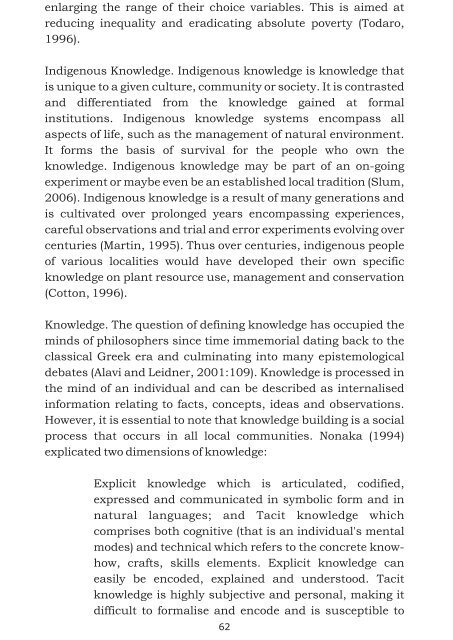Beneficiaries are actors too.pdf - Southern Institute of Peace ...
Beneficiaries are actors too.pdf - Southern Institute of Peace ...
Beneficiaries are actors too.pdf - Southern Institute of Peace ...
Create successful ePaper yourself
Turn your PDF publications into a flip-book with our unique Google optimized e-Paper software.
enlarging the range <strong>of</strong> their choice variables. This is aimed at<br />
reducing inequality and eradicating absolute poverty (Todaro,<br />
1996).<br />
Indigenous Knowledge. Indigenous knowledge is knowledge that<br />
is unique to a given culture, community or society. It is contrasted<br />
and differentiated from the knowledge gained at formal<br />
institutions. Indigenous knowledge systems encompass all<br />
aspects <strong>of</strong> life, such as the management <strong>of</strong> natural environment.<br />
It forms the basis <strong>of</strong> survival for the people who own the<br />
knowledge. Indigenous knowledge may be part <strong>of</strong> an on-going<br />
experiment or maybe even be an established local tradition (Slum,<br />
2006). Indigenous knowledge is a result <strong>of</strong> many generations and<br />
is cultivated over prolonged years encompassing experiences,<br />
c<strong>are</strong>ful observations and trial and error experiments evolving over<br />
centuries (Martin, 1995). Thus over centuries, indigenous people<br />
<strong>of</strong> various localities would have developed their own specific<br />
knowledge on plant resource use, management and conservation<br />
(Cotton, 1996).<br />
Knowledge. The question <strong>of</strong> defining knowledge has occupied the<br />
minds <strong>of</strong> philosophers since time immemorial dating back to the<br />
classical Greek era and culminating into many epistemological<br />
debates (Alavi and Leidner, 2001:109). Knowledge is processed in<br />
the mind <strong>of</strong> an individual and can be described as internalised<br />
information relating to facts, concepts, ideas and observations.<br />
However, it is essential to note that knowledge building is a social<br />
process that occurs in all local communities. Nonaka (1994)<br />
explicated two dimensions <strong>of</strong> knowledge:<br />
Explicit knowledge which is articulated, codified,<br />
expressed and communicated in symbolic form and in<br />
natural languages; and Tacit knowledge which<br />
comprises both cognitive (that is an individual's mental<br />
modes) and technical which refers to the concrete knowhow,<br />
crafts, skills elements. Explicit knowledge can<br />
easily be encoded, explained and unders<strong>too</strong>d. Tacit<br />
knowledge is highly subjective and personal, making it<br />
difficult to formalise and encode and is susceptible to<br />
62


